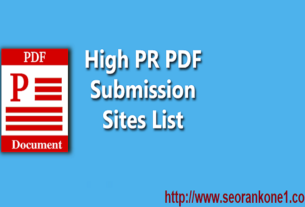Search engine algorithms such as Google use your website’s content to determine what your page is all about, as it cannot recognize visual information. Instead, they rely on keywords and tags incorporated in the HTML of the webpage. Search engines utilize the information in your content through specific words or phrases and provide the most relevant pages based on it. However, every search engine has its unique algorithm to rank the pages. Popular search engines such as Google & Yandex use several other complex factors to sequence the results.
If your content does not convey crucial information to the search engine, it will not show on the search results’ higher side. In the worst-case scenario, the pages that rank higher may belong to your competitors. Therefore, to reach a higher number of customers, your content must be optimized correctly.
Below, we will walk you through the key factors that influence your page’s ranking on popular search engines.
Different Keywords Rank Different Pages
When it comes to your site’s ranking, Search Engines such as Google highly emphasize the feature of domain authority. However, different phrases or keywords can rank other pages of the site if optimized well. It means, if your website has ten different pages, you could potentially rank each one of them in various search results.
To perform this practice more efficiently, you may base the content of every page of your site on unique keywords. Although this practice seems tedious, it is essential to consistently check domain traffic and only rely on the most relevant content. However, it is also crucial to avoid redundancy in your content. It means if multiple pages of your website use the same keywords, they would eventually end-up competing with each other.
In this manner, you can efficiently perform content optimization on your page and compete strategically with other contenders in your industry.
Optimized Content Helps the Visitor Find What They Are Searching
When a potential customer looks up on the search engine for a specific product, he/she uses related keywords or general phrases linked to it. Moreover, most customers tend to perform a purchase from the sites that present the most appealing content. However, after researching several sites providing similar products, they will recall the pricing and reviews to make up their minds. That is the phase where keywords play a critical role, as the customers click on the general keywords that pop-up in their minds.
Another vital aspect here is the headings and titles placed on your website. Potential customers often go for the providers with the relevant keywords embedded on either their company’s name or website header.
Optimized Title Tags and Meta Descriptions Improve CTR
Title tags and Meta descriptions are two of the most convenient ways to optimize your content. These elements tell the search engines and potential customers about the information on your page.
Use appropriate keywords that relate to your product or services to improve the page’s ranking. However, Meta descriptions do not directly influence your site’s rankings; they play a significant part in enhancing its click-through rate.
Generally, people do not see a direct SEO benefit in using optimized Meta descriptions. Yet, it contributes much to improve its overall ranking. That is mainly because the essential purpose of SEO is to attract more visitors to your business. Additionally, this practice can be possible by merely incorporating optimized Meta descriptions and titles in the page’s content.
Also, search engines are now implementing principles of CTR in their algorithms to rank the pages. It means the more authentic click your website earns, the higher the chances to improve its ranking. Thus, a high click rate coupled with a lower bounce rate is essential in the SEO process of your site.
Develop Your Outline & Create an Optimal Readability
Focusing on a productive outline that encompasses your product or services is vital for your website’s overall optimization. Ensure your content is formatted flawlessly – the more readable your content, the better customer retention.
The element of readability is essential as users usually have a minimal attention span – they are not going to spend time over one huge para. Therefore, stick with paragraphs with no more than 2 -3 lines and each line with a maximum of 30 words in it. Also, make a habit of breaking up the content by incorporating sub-headings in it, with each sub-headings carrying 150–300 words.
Stick to Your Target Keyword and Perform Strong Back-linking
While producing quality content with the best optimization practices for your site, always stick around the topic and relevant keywords. Do not try to override your content with redundant information; try putting variety in it. Staying hyper-focused on the subject and keywords of your choice will create a sublime piece of content, having the capacity to retain potential customers.
But as stated earlier, genuineness and domain authority are equally important when it comes to website optimization. Therefore, backlinking through authority and trustworthy domains can ensure your site’s credibility, improving its overall ranking. Be sure you are using appropriate phrases and keywords in backlinking. Popular search engines follow a strict policy over relevance.
Through the smart placement of hyperlinks in relevant phrases or keywords, you can achieve a better page ranking. In SEO, the positioning of backlinks plays a crucial role in the content. Backlinks that are contextual and used subtly impact the ranking of the page positively.
Conclusion
Finding the right balance between information and relevance is instrumental for your page. Even one good blog per week can do the trick for some websites, while others with non-relevant content fail to garner results even with five blogs per week.
Nevertheless, identifying the right frequency of blog posting and complementing it with optimized content is vital for conquering the audience. Content relevance is not just about its publishing frequency, but the level of optimization ingrained in it.
Content not optimized for the target audience will barely produce the desired results. Tailor your content nicely to your audience’s wants and preferences, keeping in mind the precise SEO practices.



